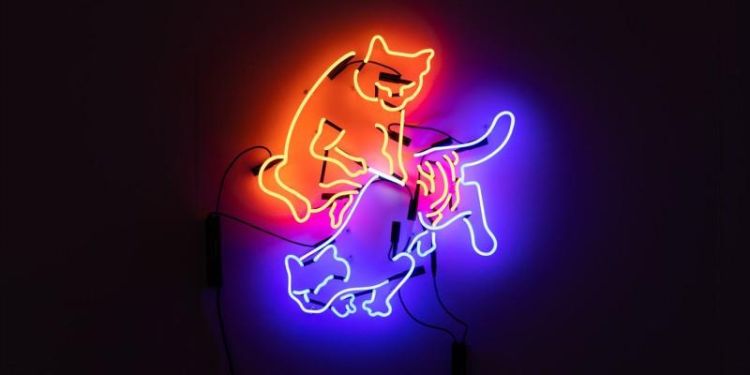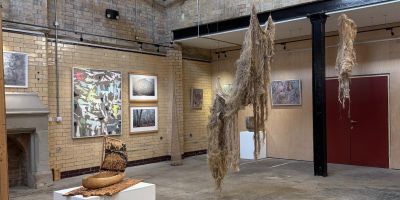New exhibition by Hang Zhang creates a fictional world grounded in real places and histories

Kai Pacha: The Earth We Dwell is an exhibition of new work by practice-led Postgraduate Researcher Hang Zhang, opening in our Project Space this November.
Kai Pacha is a Quechua term from Andean cosmology, signifying the present time-space, the realm inhabited by humans and land animals.
In Andean belief systems, existence is divided into three interconnected realms: ‘Uku Pacha’ (the lower realm, associated with death, ritual, and subterranean elements); ‘Kai Pacha’ (the middle realm where humans and animals live); and ‘Hanan Pacha’ (the upper realm, symbolising the spiritual domain where celestial beings, gods, and the divine reside).

Llama Skull, ceramic sculpture, part of “the Relic of Llamabamba”. Image courtesy of Hang Zhang.
Kai Pacha: The Earth We Dwell (‘Kai Pacha’) is the second exhibition in Hang Zhang’s PhD trilogy, following Uku Pacha: The Inner World, held in the School of Fine Art, History of Art, and Cultural Studies’ Project Space in August 2023.
Inspired by Zhang’s initial field trip to Peru in Spring 2023, Uku Pacha explored the sacredness of lamoid species (llamas, alpacas, vicunas and guanacos) within the Andean Mountain range.
Fifteen months later, the journey advances with Kai Pacha, where Zhang expands her focus from a specific cultural and ecological perspective on lamoid species to a broader exploration of the shared time-space inhabited by herself and other creatures, including lamoid species. This expanded scope invites a reflection on the interdependence and coexistence within our shared world.

Hang Zhang, The Shrine of Llama God, ceramic sculpture, part of “the Relic of Llamabamba”. Image courtesy of Hang Zhang.
Hang Zhang is a Chinese artist and researcher based in London and Leeds. Her art and research explore the intersections of place, beings, and stigma, with a particular focus on nonhuman entities in human history.
Zhang’s research interests lie in social and species constructions, viewed through the lens of inequality. She sees it as an artist’s social responsibility to give a voice to the underrepresented, whether human or nonhuman.
This conviction has led her to explore a range of subjects—like Zhang’s late pet Sam, a small lab beetle that would not normally get human care or compassion; heavily tattooed woman bodies stigmatised by the stereotypical association with sexually open and/or poor taste of working class; and Andean camelid farmers whose lives have been deeply impacted by post-colonialism and capitalism.

Hang Zhang, Three Studies of the Axis Mundi, ceramic sculpture. Image courtesy of Hang Zhang.
Having graduated with a first class honours BA Fine Art degree in 2021, Hang Zhang continued her studies in the School of Fine Art, History of Art and Cultural Studies and finished her MA Fine Art in September 2022.
Zhang’s ongoing practice-led PhD project at the University of Leeds – Using Fictional Narratives within Artistic Practice to Deconstruct the Cultural Images of Lamoid Species – investigates the cultural images of South American lamoid species in globalisation under the epochal impacts of post-colonisation and the Internet.
Recent exhibitions include ING Discerning Eye Exhibition at Mall Galleries in London (November 2024), Air Open at the Air Gallery in Manchester (July to September 2024), and Total Recall, Myth and Memory at Mercer Art Gallery in Harrogate (July to October 2023).
Two of Zhang’s pieces were selected for the RA Summer Exhibition 2023 in London, where she won the British Institution Fund Award for her neon sculpture Cat Tattooing Cat.

Cat Tattooing Cat from Hangover Square (2022). MA Fine Art Degree Show, September 2022, School of Fine Art, History of Art and Cultural Studies, University of Leeds. Photograph by Jules Lister.
Hang said:
“In the past fifteen months, I have spent time in three key locations central to my project: the UK, the Peruvian Andes, and mainland China.
“Through examining the role of lamoid species within the histories and contemporary cultures of these places, I have also undergone significant personal and professional transitions.
“This interweaving of life and artistic practice has led my work to evolve into a more abstract, fluid form, mirroring the complexity and changeability of the earth we dwell.”

Hang Zhang, Piñata, inflatable sculpture displayed at a residential block. Image courtesy of Hang Zhang.
Kai Pacha is presented as a multimedia installation, weaving insights from diverse cultural contexts to create a fictional world grounded in real places and histories.
One of the central pieces, Relic of Llamabamba, is a ceramic project featuring 24 pseudo-artefacts crafted in Peru’s Sacred Valley during Zhang's residency with Arquetopia.
These artefacts are incorporated into the installation to build a narrative thread. Additionally, Kai Pacha includes a vintage monitor triptych, which humorously references the political symbolism of alpacas among Chinese netizens, including Ai Weiwei, from 2009 to the early 2010s.

Hang Zhang, Golden Llama Figure, inflatable sculpture. Image courtesy of Hang Zhang.
A series of smaller works in various media will also be arranged in a deliberately chaotic manner to evoke the layered, often messy nature of the world we share.
In Kai Pacha, Zhang not only archives her creative output from the past fifteen months but also experiments with format, creating a parallel world that, while fictional, feels familiar. By inviting viewers into this constructed space, she encourages a re-evaluation of our shared time-space and our connections with each other and other species.

Hang Zhang, Silver Llama Figure, metal. Image courtesy of Hang Zhang.
Mark Westgarth, Professor of History of the Art Market and one of Hang Zhang’s PhD supervisors, said:
“It’s fabulous to see Hang’s artwork in the Project Space in the school.
“Hang’s work has already been recognised nationally by the British Institution Award and the new work she has created for this exhibition is a clear demonstration of how her practice-led research continues to evolve in fascinating ways.”
More information
Kai Pacha: The Earth We Dwell runs from 28 to 30 November in Project Space, located in the School of Fine Art, History of Art and Cultural Studies at the University of Leeds.
The exhibition is open daily from 12 to 6pm. Entry is free and all are welcome.
Find out more about Kai Pacha: The Earth We Dwell.
Find out about Hang Zhang’s research and art practice.
Follow Hang on Instagram @hangzhang.art
Feature image
Hang Zhang, Shadow Puppetry, shadow puppetry sculpture. Image courtesy of Hang Zhang.




